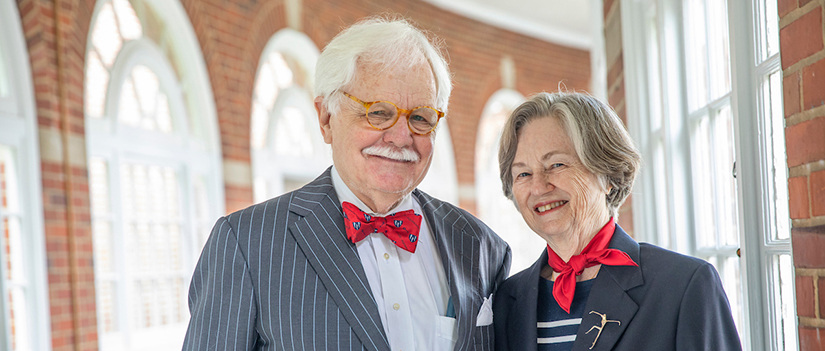Future School of Medicine library named for couple with deep ties to the university and medical school
In the next several years, the university’s School of Medicine Columbia campus is planning a major move to a site adjacent to its clinical partner, Prisma Health Midlands, in what will be a modern and technologically advanced facility. It’s not surprising that the first major financial commitment to this initiative came from Charles and Donna Bryan, a couple with long and deep ties to the university and the School of Medicine in Columbia. Their $1 million gift, the latest and largest gift commitment in their 35-year history of giving to the university, will support construction of a new medical education building to include the Charles S. and Donna H. Bryan Health Sciences Library. The Bryans hope their early gift will inspire others to support the new campus.
Plans call for moving the Charles S. Bryan History of Medicine Room, established at the school’s current VA campus library through an earlier gift from the Bryans, to the new campus. Also moving to the new campus library will be another resource established by the Bryans’ philanthropy: the Osler Room, which pays tribute to the life and legacy of Sir William Osler (1849–1919).
Dr. Bryan was a charter faculty member of the School of Medicine and served successively as director of Infectious Diseases, chair of the Department of Internal Medicine and director of the Center for Bioethics and Medical Humanities. His publications, which include some 500 contributions to the medical literature and 13 books and monographs, deal especially with bloodstream and hospital-acquired infections, medical history, and medical biography. Most recently he edited an encyclopedia pertaining to Osler with 138 contributors from four continents. He also wrote the initial grant for care of uninsured and underinsured patients with HIV disease in the Midlands.
Donna Bryan served 10 years as administrative assistant in the Department of Pediatrics — it was during that time that the Bryans met and married — and wrote a comprehensive healthcare plan for South Carolina’s children. In 1986 she founded the Seeds of Hope Farmers Market Project to provide reliable markets for small-scale African-American vegetable farmers. Through this project, which she still leads 35 years later, churches, synagogues and workplaces use their facilities to provide markets for farmers and fresh vegetables for customers, many of whom are senior citizens.
Both Charles and Donna Bryan have received state and national recognition for these contributions. Dr. Bryan has received national awards for his contributions to the medical humanities, and also the Order of the Palmetto for service to the state. Donna Bryan’s work with the Seeds of Hope Farmers Market Project was recognized by a special resolution of the South Carolina State Senate.
However, both are motivated mainly by higher causes. Dr. Bryan feels strongly that medicine must remain a scholarly profession, and that medical students must appreciate their heritage — love of science and technology combined with love of humankind. He envisions the History of Medicine Room and the Osler Room as visible reminders of this heritage. He likewise believes the Health Science Library should contain books despite the increasing digitization of medical information.
Donna Bryan finds meaning in her service to African-American small-scale farmers, many of whom live in relatively impoverished rural areas. “The old saying that farmers are the salt of the earth is true,” she says. “I’ve met some of the most wonderful people living on farms. The Seeds of Hope project has helped farmers, but it has been a real blessing to me to get to know the farm families and the communities they serve.”
The true scope of the Bryans’ philanthropic legacy is measured not merely in dollars and cents or even in decades of philanthropic support. It is, rather, the sum of their dedication to the ideals of education and service to humanity, a legacy that will endure for ages.
Posted by Alyssa Yancey (alyssa.yancey@uscmed.sc.edu) | Aug. 31, 2020
